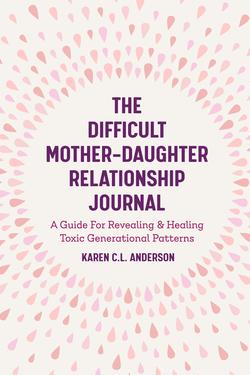Читать книгу The Difficult Mother-Daughter Relationship Journal - Karen C.L. Anderson - Страница 11
На сайте Литреса книга снята с продажи.
ОглавлениеAnswers
Should I do this with her?
No. You can, of course, but I suggest you do the work on your own, at least at first.
Does she have to be alive?
No. This isn’t so much about the two of you as it is about you making some choices about how you want to show up in the world. This is about your future, and not just in relation to her (whether she’s alive or not). If she is no longer here, shift the tense of the questions to suit the situation.
I don’t want to have to talk to/see/interact with her. Are you going to suggest that I should?
Absolutely not. For some women, choosing to not have her in their lives is the very best choice. You can, however, make these kinds of choices from a loving, proactive, powerful place, not from a reactive, defensive place, for your own sake. There is an option to reinitiate contact if that is what makes sense for you, and this guided journal will help you decide and take the appropriate action.
She is/was abusive and violent. Am I supposed to forgive and forget?
No. This work isn’t about putting up with or approving of any type of abuse, whether it happened long ago or is happening now. It’s about learning how to tell the story about what happened in such a way that it no longer hurts or minimizes you, but rather empowers and liberates you. It’s about learning how to establish healthy limits and boundaries (up to and including no longer seeing or speaking to her).
Forgiveness is a concept that is misunderstood and too often applied in situations where one or both parties aren’t ready. Don’t force or shame yourself into forgiving. Work toward developing your own standards of what is okay or not okay, based on your values (there are plenty of prompts in the journal that will help you do just that).
The only forgiveness I recommend is self-forgiveness.
She is/has [insert addiction, mental illness, or personality disorder]. This won’t work because of that. She doesn’t or seemingly can’t respect my boundaries.
It may not work for her. She doesn’t have to do it, and she doesn’t have to know that you are doing it. Her disrespect doesn’t mean that boundaries don’t work…or that you’ll be a failure at setting them. It simply means you are being invited to respect yourself.
How is this guided journal different than Difficult Mothers, Adult Daughters: A Guide for Separation, Liberation & Inspiration?
This journal is designed to help you create a reference for yourself, based on your needs, values, wants, and preferences, not hers. And while this book includes some of the same prompts and practices, it expands on them and includes many more. It also opens the door to mothers who wish to take a deep look inside. I wanted it to be more inclusive, to bridge greater understanding, and to create healing on both micro and macro levels.
D
If you are interested in my guidance as you work through this journal, please send me an email: karen@kclanderson.com. I offer one-on-one coaching to mothers and daughters (separately or together).
